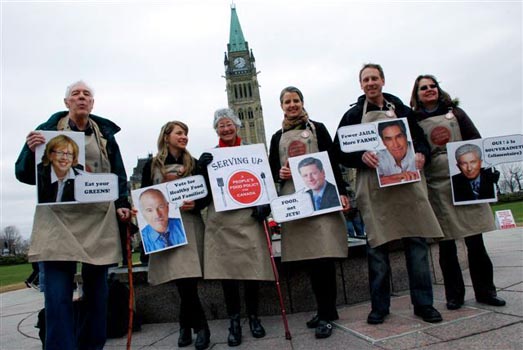Canada urgently needs a national food policy. Close to 2.5 million Canadians are regularly concerned about having enough food to eat — more than the populations of Calgary and Ottawa put together. At the same time, one in four Canadians is considered obese. Hunger and obesity strain not only individuals and families, but an already overburdened healthcare system — with wide-ranging physical, mental and social health implications. The current approach to food in Canada is also failing food producers, and the environment. We are losing thousands of farms a year — 67 a week nationwide. And the food system is a leading contributor to climate change — responsible for somewhere between 30 and 57 per cent of global greenhouse gas emissions. The status quo is no longer an option.
The need for change is obvious, and food has, for the first time, become an election issue. All five federal parties are advancing either national food strategies, or policies. In the next year, it is likely that steps will be taken to create Canada’s first national food policy. It is critical that the voices of Canadians across the country, the food movement, and people who don’t have enough to eat, are actively involved in deciding what this will mean in practice.
“Resetting the Table: A People’s Food Policy for Canada,” launched this week in Ottawa, is the first-ever citizen-led national food policy. The People’s Food Policy lays the groundwork for a Canada free of hunger, with decent livelihoods for food producers and sustainable environment for the future. Developed over two years, it is based on the work of hundreds of people who devoted thousands of volunteer hours to create a policy that genuinely reflects the perspective of Canadians from coast-to-coast-to-coast. The People’s Food Policy is grounded in 10 detailed discussion papers which cover subjects ranging from agriculture, to health, to the environment, to fisheries, to Indigenous food systems, to science and technology to international food policy. As a result, it is the most comprehensive national food policy being advanced in Canada today.
The People’s Food Policy has dozens of policy recommendations. Among the key ones are:
– Food should be eaten as close as possible to where it is produced. This would ensure that more Canadians are able to eat fresh and healthy home-grown food, and bring more resilience to the livelihoods of Canadian food providers. This would mean not only increased support for well-known local food approaches such farmers markets, urban agriculture, and community-supported agriculture, but a more systemic shift towards support for Canadian food. A key example of this would be the creation of legislation where institutions and retailers would include a set percentage of Canadian food in what they serve and sell.
– The food system is a leading contributor to climate change. In order to ensure food for the future, a key priority for the People’s Food Policy is supporting food producers in a widespread shift to ecological food production. This would include increased support for initiatives such as organic agriculture, community-managed fisheries and indigenous food systems, as well as the creation of transition plans for existing farmers and fishers to move to more ecological ways of producing food.
– It is unacceptable that close to 2.5 million Canadians are food insecure. The People’s Food Policy calls for the creation of federal poverty elimination and prevention programs, with measurable targets and timelines, to ensure Canadians can better afford healthy food.
– Canada is the only G8 country with no national school meal program. The People’s Food Policy calls for a federally funded Children and Food Strategy, including school meal programs, school gardens, and food literacy programs to ensure that all children at all times have access to the food required for healthy lives.
As we head into the final weeks on the campaign trail, the People’s Food Policy is encouraging voters to attend debates and ask candidates questions about food policy. The future of food in Canada is now.
Anna Paskal is a writer and organizer on food issues in Canada and internationally. She is the policy lead for the People’s Food Policy and on the advisory board of Food Secure Canada. She is also an author and award-winning filmmaker.
To read the People’s Food Policy, and to sign the People’s Food Policy Pledge, please click here.




